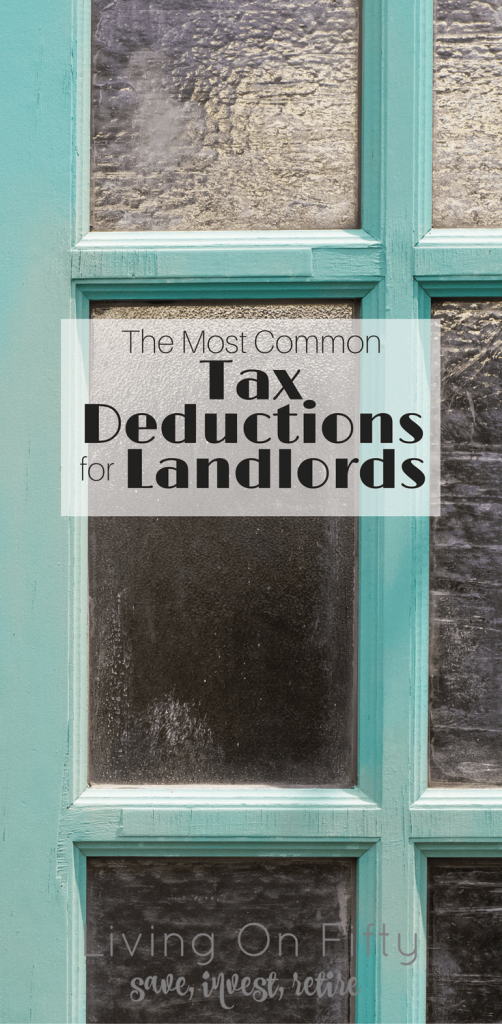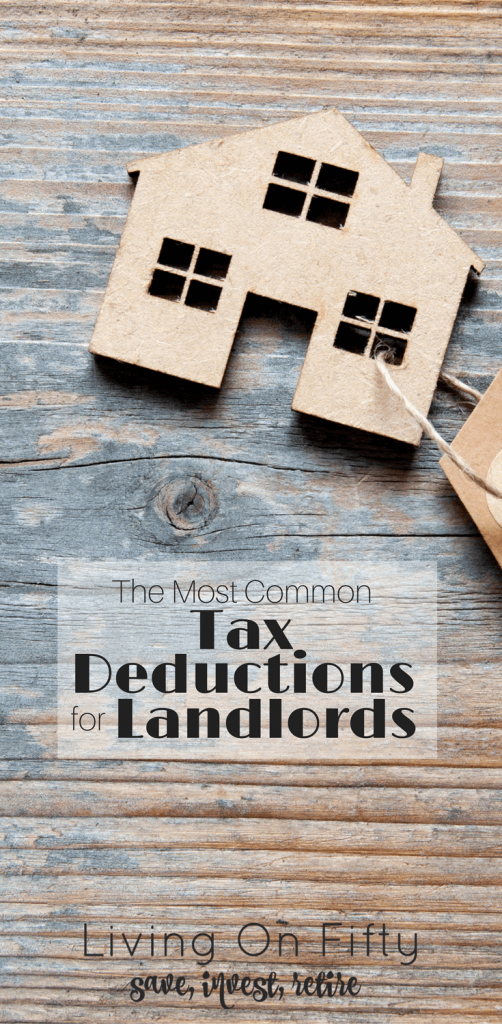We recently became landlords at the age of 26, and were thrilled to see a plan that was 3 years in the making come to fruition.
Obviously, we did this because of some seriously awesome monetary benefits, but besides those our taxes are going to benefit from owning rental property as well.
For those of you that have been around the block with owning your own business and paying taxes on that income, you know that the process of doing your own taxes with business income can be, well, complicated (to say the least).
But when it comes down to it, most tax deductions for landlords make a lot of sense. In fact, you’re probably already associating a lot of these costs with your rental property on your Profit and Loss Statement already.
In this article, I’m going to break down the federal tax deductions for landlords in the U.S.
With that being said, while I do have a Bachelor’s degree in Accounting, and I worked as a Tax Accountant for a period of time, as well as having owned my own business for several years now, I am not currently a tax professional, or CPA. I just want to help you make the most of the tax deductions on your rental property by utilizing every single one of them (if you can)
Let’s get started!
There are two kinds of expenses: Capital Expenses and Current Expenses.
Capital Expenses are anything that adds value to the property, or lengthens the life of it. Capital Expenses must be depreciated over several years. If you’re unsure, generally something that costs more than a few hundred dollars is considered a Capital Expense. Some examples of Capital Expenses:
- New Appliances
- Upgraded bathrooms/kitchen
- New floors
Current Expenses are more frequent, and do not add value to the property. Current Expenses can be deducted, in full, on your taxes for the year they were incurred, NOT depreciated. Repairs fall under the category of a Current Expense – anything that keep the property in it’s original working condition. Some examples of Current expenses are:
- Utilities
- Mortgage Payment
- Insurance
- Mileage
- And many, many, more
A Quick Note About Backup: In the account world, we call receipts, invoice, etc, “backup” for expenses, because they do precisely that: back-up expenses. This way, if the IRS ever audits us, we will have proof that we incurred said expenses. When you’re doing your own taxes, be sure you have backup for everything, and that it’s organized and easy to find, should the IRS ever come knocking.
Now that you know the difference between Current and Capital Expenses, here are tons of the expenses you’re likely to incur as a landlord, and how to deduct the expense on your taxes:
Repairs
Thing break.
All the time, when you have a rental property.
And the tax law defines repairs as any expense incurred maintaining the current condition of the property. So, if the plumbing springs a leak, the cost of a plumber to repair it would be considered a Current Expense for repairs. Here are some other examples:
- Painting
- Drywall repairs
- Fixing the air conditioner
- Light Bulbs
- Labor Costs to perform repairs
- Incidental related to the repairs
- Purchase and Rental fees for tools & equipment
There can be so many different repairs on a rental property, it would be impossible to list them all, so just remember the rule of thumb: if it costs more than few hundred dollars and adds value to the property, then it’s a Capital Expense. If not, it’s a current expense and may fall under the category of repairs.

Maintenance
Maintenance and repairs can often be confused, and its’ understandable.
The difference lies in why you’re doing the repair or maintenance. Repairs fix something that is broke, maintenance handles something not necessarily broken. Some examples of maintenance would be:
- Replacing light bulbs
- Smoke detector batteries
- Landscaping
- Lawn mowing
- Homeowner’s association dues
- Filters for the Air Conditioner and Heater
Utilities
Any utilities you pay on the property can be used as a Current tax deduction.
- Water
- Sewer
- Electricity
- Gas
- Trash
Travel
Owning a rental property can often cause you to incur a lot of travel expenses – especially if you manage the property yourself. There are many types of travel expenses:
- Mileage
- Air Fare
- Car Rentals & Taxi Far
- Hotels
- Meals (50% of which can be deducted while traveling)
When it comes to mileage, you can take your deduction one of two ways: by deducting the actual expenses incurred, or by taking the standard deduction of 53.5 cents per mile driven. This includes use of personal or business vehicles.
Mortgage Payment
If you have a mortgage on the property (we do), then I’ll bet the principal and interest you pay each month will be the single biggest Current Expense on your taxes. It is fully deductible. In addition, if you paid for points on your mortgage, closing costs, or cost to refinance, those are fully deductible as a Current Expense as well.
You can deduct:
- Mortgage Interest
- Interest on HELOC or Home Equity Loans
- Credit Card Interest if you used those cards to buy items for the property
- Mortgage Points
Taxes
Taxes are a very real expense when you own a rental property – and they come in more forms that just income tax:
- State, County, and City Taxes
- Personal Property Taxes
- Permit Fees
- Inspection Fees
- Payroll Taxes for Employees: Social Security, Medicare, Unemployment
Frequently, your property taxes will show up on documents from your mortgage company. But if you don’t have a mortgage, then you’ll have to keep your tax bills and receipts as backup for your tax deductions. Didn’t keep them? Don’t worry – many municipalities allow you to look them up online, or even request one by mail.
Depreciation
If you own a rental property, then you have a lot of valuable items wrapped up in the that property. Here are some common things you’ll need to qualify as Capital Expenses, and then depreciate:
- The value of the home (not the land)
- The value of improvements made to the property (new kitchens, bathrooms, windows, appliances, etc)
- Equipment for the business such as your computer
If you use a tax program such as Turbo Tax (my personal favorite), the program will help you determine exactly how long to depreciate those expenses for. If you do your taxes by hand, then you’ll need to consult a depreciation table and keep track of what has been depreciated and when.
Cleaning Services/Supplies
When a tenant vacates your property, it will need to be deep cleaned, and you can either do this yourself or hire it out. In either case, these costs can be deducted:
- Cleaning supplies
- Paying for cleaning services
Insurance
Investment property usually carries several types of insurance for the property as well as for you, the owner:
- Homeowner’s Insurance
- PMI (Mortgage Insurance Premiums)
- Liability Insurance
- Flood Insurance
- Workman’s Compensation Insurance
Policies vary from business-to-business and from property-to-property. You will be required to have Homeowner’s Insurance, but others such as the Liability Insurance, Flood Insurance, Personal Liability, and an Umbrella Policy that will protect you from personal asset and property loss in case you get sued or a natural disaster happened.
Management Fees
If you don’t manage your property yourself, then you’re probably paying a management fee to a company or individual to manage it for you. If you did hire a property manager, you are allowed to deduct anything you pay them.
Legal Fees
Legal fees happen, and they’re not limited to legal-system induced fees. There are many times when you might incur legal fees:
- Tax Preparation Fees
- Bookkeeping Fees
- Tax Preparation/Bookkeeping software
- Legal Fees
- Lease Review & Preparation
- Court Filing Fees
Each year, you can deduct your bookkeping and tax preparation expenses. And if you ever have to evict a tenant, you an deduct all the fees associated with that as well.
Office Expenses/Business Expenses
Owning rental property doesn’t leave you when you go home at night, which is why you might be tethered to your cell phone, or even have an office at home. I’m in this camp too. Here are some of the business/home office expenses you can deduct as Current Expenses:
- Utilities (a percentage, as pertain to your home office)
- Wifi
- Cell Phone
- Office Supplies
- Printer & Ink
However, a home office deduction is one of the most frequently flagged deductions by the IRS, so if you do take the deduction, it is important to make sure you have all of your paperwork in order. Keep all receipts, paid utility bills, and anything else that pertains to the home office to make sure you’re within the law.
Start-Up Expenses
When you’re getting your rental property business up and running, it’s normal to have start-up costs, which are classified as “Any expense that would be deductible as an operating expense by an ongoing business is a start-up expense when it’s incurred before a business begins. Unlike operating expenses, start-up expenses cannot automatically be deducted in a single year. This is because the money you spend to start a rental (or any other) business is a capital expense—a cost that will benefit you for more than one year.” (Stephen Fishman, J.D.)
In other words, if you’re rehabbing a house to be fit for tenants, those would be considered start-up expenses, because they happened before the business began. In that case, you’l need to spread those losses over several years.
The maximum allowably deduction for start-up expenses in one year is $5,000.
Losses
Losses are a natural part of the rental business, and if you haven’t built them into your business plan, you should right away.
And when they happen you CAN deduct them, but it’s tricky. You’re only allowed to deduct $25,000 of loss each year.
Here’s an example:
Let’s say you did $75,000 of improvements to a property in a year. Those improvements would be considered Capital Expenses and be depreciated over several years.
However, you only generated $25,000 of income from the property during the year.
This leaves you with a loss of $50,000 for the year.
Since you’re only allowed to deduct a $25,000 loss, you would take the $25,000 loss this year, then recapture another $25,000 next year.
Of course, each specific business is unique in that it has it’s own expenses, which may or may not be listed here, so make sure to do your own research before taking this article as the gold standard.
But these deductions should get you started tracking down paperwork and starting on your taxes.
Happy hunting!

This post may contain affiliate links. See my disclosures for more information.














Great list. I would definitely recommend keeping a good record of your miles. I use an app called MileQ. It tracks everything and its easy to manage.
Great info.
Question: If I have to replace an appliance that no longer works, is that a current expense or a capital improvement that I would then have to write off over time?